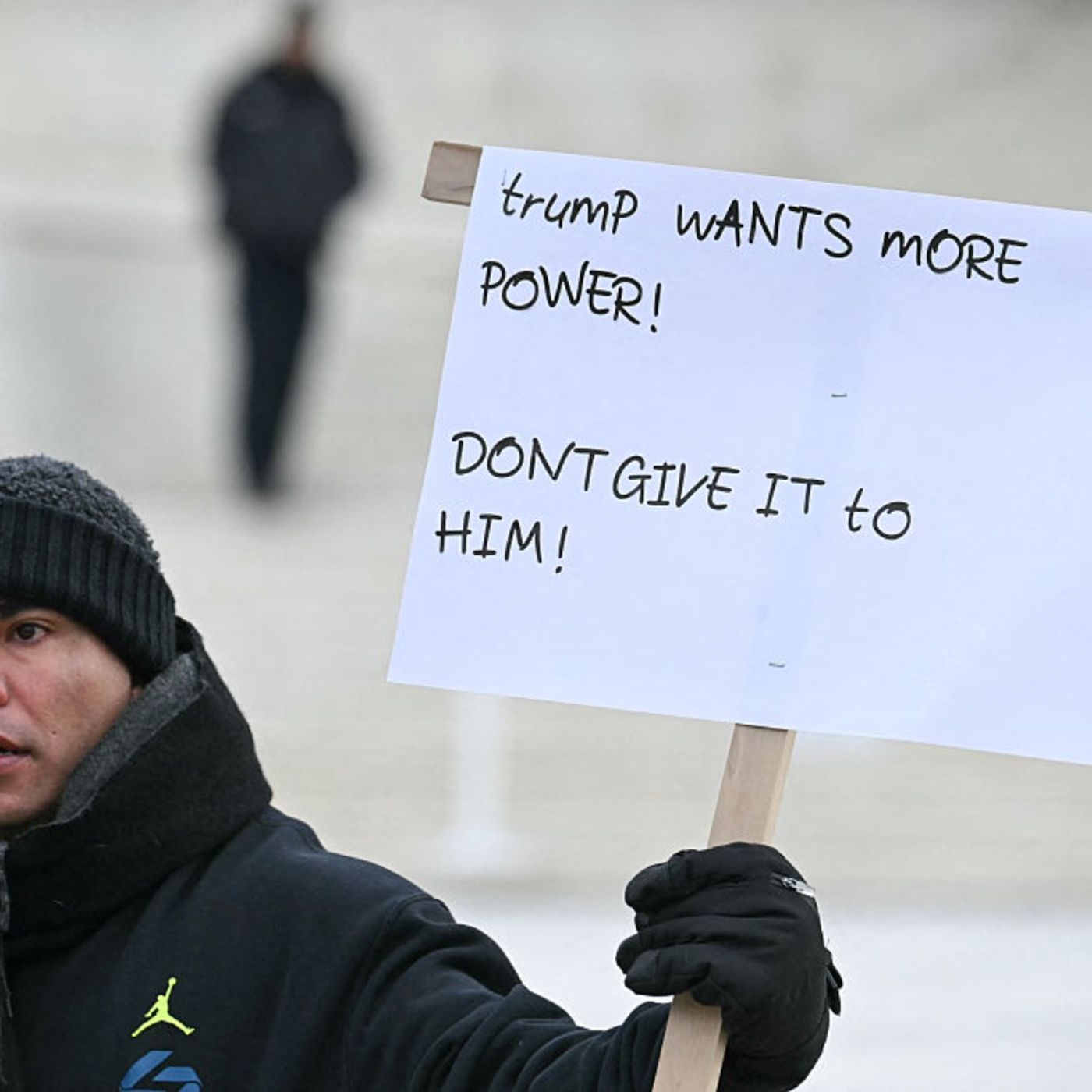Discover On the Media
On the Media

On the Media
Author: WNYC Studios
Subscribed: 47,911Played: 1,831,886Subscribe
Share
© WNYC
Description
The Peabody Award-winning On the Media podcast is your guide to examining how the media sausage is made. Hosts Brooke Gladstone and Micah Loewinger examine threats to free speech and government transparency, cast a skeptical eye on media coverage of the week’s big stories and unravel hidden political narratives in everything we read, watch and hear.
1836 Episodes
Reverse
And just like that, 2025 is coming to a close. On this week’s On the Media, hear a tour of a 12-month news blitz, from AI to the Pentagon press room to the reshaping of legacy outlets. Plus, what we can expect from the year to come.[02:33] This week, Brooke and Micah review how legacy outlets made big changes in the wake of Donald Trump’s inauguration this year. Featuring: Oliver Darcy, author of the newsletter Status.[11:53] Brooke and Micah take stock of the administration’s embrace of far right online personalities – in the White House and in the press room. Plus, a review of the wreckage DOGE has left in its wake, and Trump’s crackdown on free speech.Featuring: Vittoria Elliott, senior reporter at Wired, Ryan J. Reilly, senior justice reporter for NBC News, Brandy Zadrozny, senior reporter at MS NOW, Anna Merlan, senior reporter for Mother Jones, Corey Robin, professor of political science at Brooklyn College.[37:38] Brooke and Micah review how the press covered the deployment of the national guard; the aftermath of Charlie Kirk’s murder; and the ongoing turmoil at CBS. Plus, how to steel ourselves for the year ahead.Featuring: Jamison Foser, media critic and author of the newsletter Finding Gravity, and Jamelle Bouie, columnist for The New York Times.
On the Media is supported by listeners like you. Support OTM by donating today (https://pledge.wnyc.org/support/otm). Follow our show on Instagram, Twitter and Facebook @onthemedia, and share your thoughts with us by emailing onthemedia@wnyc.org.
The New Yorker turned a hundred this year. And marking the occasion is a new documentary film on Netflix titled: “The New Yorker at 100”. But with some 5000 print issues, and ten decades worth of reporting, illustrating, and editing… where does one even begin? That’s a question staff writer Jelani Cobb brought to the film’s director, Marshall Curry, and executive producer, Judd Apatow, on an edition of The New Yorker Radio Hour that we're sharing this week.
On the Media is supported by listeners like you. Support OTM by donating today (https://pledge.wnyc.org/support/otm). Follow our show on Instagram, Twitter and Facebook @onthemedia, and share your thoughts with us by emailing onthemedia@wnyc.org.
Donald Trump has signed an executive order limiting state regulation on artificial intelligence. On this week’s On the Media, Republicans spar over AI, and what deregulating the industry means for the rest of us. Plus, how AI fakery got better in 2025.[01:00] Host Brooke Gladstone sits down with Maria Curi, tech policy reporter for Axios and author of the Axios Pro: Tech Policy newsletter, to chat about the massive bets that Silicon Valley and the White House are making on artificial intelligence. [13:10] Host Micah Loewinger talks with Stephen Witt, author of the book The Thinking Machine, about the massive infrastructure project, and potential problem, that is AI.[28:54] Brooke speaks with Craig Silverman, cofounder of Indicator, about why Big Tech embraced fakeness in 2025, and what that means for 2026 and beyond. Further reading / watching:“States defiant in face of Trump's AI executive order,” by Maria Curi“MAGA scrambles to influence Trump's AI executive order,” Maria Curi“Inside the Data Centers That Train A.I. and Drain the Electrical Grid,” by Stephen Witt“2025: The year tech embraced fakeness,” by Craig Silverman & Alexios Mantzarlis
On the Media is supported by listeners like you. Support OTM by donating today (https://pledge.wnyc.org/support/otm). Follow our show on Instagram, Twitter and Facebook @onthemedia, and share your thoughts with us by emailing onthemedia@wnyc.org.
This year, Silicon Valley poured its collective resources in AI. Billions and billions of dollars. But behind the snazzy ads and glowing endorsements, some users and journalists are warning of bigger issues with the largely unregulated industry. Host Brooke Gladstone sits down with Craig Silverman, cofounder of Indicator, a publication dedicated to understanding and investigating digital deception, to discuss his article arguing that this is the year Big Tech embraced fakeness.
On the Media is supported by listeners like you. Support OTM by donating today (https://pledge.wnyc.org/support/otm). Follow our show on Instagram, Twitter and Facebook @onthemedia, and share your thoughts with us by emailing onthemedia@wnyc.org.
The Supreme Court appears ready to let Donald Trump fire Federal Trade Commission members at will. On this week’s On the Media, why the court’s expansion of presidential powers would impact the entire government. Plus, how two Hollywood giants are squaring off over a massive merger. [02:47] Host Brooke Gladstone sits down with Noah Rosenblum, associate professor of law at New York University, to discuss how the Supreme Court’s pending decision in Trump v. Slaughter could radically expand the president’s power, and the history behind the case. [23:02] Host Micah Loewinger talks with Oliver Darcy, lead author of the newsletter Status and co-host of the podcast Power Lines, about the moguls at Netflix and Paramount Skydance battling over Warner Brothers Discovery, and what this means for the future of CNN, which is owned by Warner Brothers Discovery, and Hollywood. [37:41] Micah speaks with Joel Simon, founding director of the Journalism Protection Initiative at the Craig Newmark Graduate School of Journalism, about what happened with Blake Lively’s legal team subpoenaed Perez Hilton, the gossip blogger, and why expanding the legal framework of journalistic protections is essential. Further reading / watching:The Supreme Court Is About to Hand Trump a Cudgel in the Paramount-Netflix Fight, by Mark Joseph SternThe CNN Sacrifice, by Oliver DarcyThe O.G. News Influencer, by Joel Simon
On the Media is supported by listeners like you. Support OTM by donating today (https://pledge.wnyc.org/support/otm). Follow our show on Instagram, Twitter and Facebook @onthemedia, and share your thoughts with us by emailing onthemedia@wnyc.org.
Last summer, Perez Hilton, the gossip blogger who rose to fame for his scoopy and sometimes vicious takes in the early 2000s, was served a subpoena by Blake Lively's legal team. Perez Hilton decided to resist the subpoena under the argument that he is a journalist who is entitled to protect his sources. Micah speaks with Joel Simon, the longtime former head of the Committee to Protect Journalist and founding director of the Newmark School's Journalism Protection Initiative, about who gets included under the umbrella of journalism and why expanding the legal framework of journalistic protections is so important in today's media landscape. Further reading: "The O.G. News Influencer," by Joel Simon
On the Media is supported by listeners like you. Support OTM by donating today (https://pledge.wnyc.org/support/otm). Follow our show on Instagram, Twitter and Facebook @onthemedia, and share your thoughts with us by emailing onthemedia@wnyc.org.
The New York Times has sued the Pentagon for restricting access to journalists. On this week’s On the Media, meet the new cast of right wing influencers and conspiracy theorists replacing the press corps in the Pentagon. Plus, a new documentary examines the life and work of investigative journalist Seymour Hersh. [01:00] Host Micah Loewinger sits down with Dan Lamothe, who covers the US military and Pentagon for the Washington Post, to talk about the Trump administration’s shifting narrative around a second strike that killed two survivors on a boat in the Caribbean. Lamothe used to have a desk in the Pentagon as part of the press corps, but left alongside reporters from major news outlets after they refused to sign onto stringent new rules on how they could do their reporting. [16:58] Micah talks with Anna Merlan, senior reporter at Mother Jones, about the cast of right wing influencers and conspiracists now staffing the Pentagon press corps. Plus, Micah interviews Cam Higby, a member of the new press corps, about why he agreed to the Pentagon’s restrictions on access.[30:15] Micah spoke to another of the new Pentagon press corps; Cam Higby, who reports for his independent online outlet Fearless Media. He has over 750,000 followers on TikTok and over 400,000 on Instagram.[43:18] Micah speaks with Laura Poitras, a journalist and filmmaker whose past works include CitizenFour, All the Beauty and the Bloodshed, and Risk, to discuss her newest documentary. Poitras shares the process of making Cover-Up, coming soon to Netflix, which chronicles the life of investigative journalist Seymour Hersh. Poitras describes Hersh's ferocious drive to uncover government wrongdoing, and what today’s press corps can learn from him. Further reading / watching:“Hegseth order on first Caribbean boat strike, officials say: Kill them all,” by Alex Horton and Ellen Nakashima“‘Signalgate’ report contradicts Hegseth’s claim of ‘total exoneration’,”by Dan Lamothe“Meet the New Pentagon Press Corps,” by Anna MerlanCover-Up, directed and produced by Laura Poitras and Mark Obenhaus
On the Media is supported by listeners like you. Support OTM by donating today (https://pledge.wnyc.org/support/otm). Follow our show on Instagram, Twitter and Facebook @onthemedia, and share your thoughts with us by emailing onthemedia@wnyc.org.
Late last month, Reuters reported that DOGE had “disbanded,” that the group was no longer a centralized government entity. But according to Wired Reporter Vittoria Elliott, while DOGE is no longer moving across the government "in a move-fast-and-break-things blitz,” it is far from dead and gone. One source, at the USDA, told Wired that DOGE operatives had “burrowed into the agencies like ticks.” Elliott tells Brooke about how DOGE is continuing to shape the government, and what she's learned from talking to federal workers.
On the Media is supported by listeners like you. Support OTM by donating today (https://pledge.wnyc.org/support/otm). Follow our show on Instagram, Twitter and Facebook @onthemedia, and share your thoughts with us by emailing onthemedia@wnyc.org.
A new feature on X, formerly known as Twitter, has revealed that some prominent MAGA accounts are based in South Asia and Eastern Europe. On this week’s On the Media, how foreign actors funnel political rage-bait into social media feeds. Plus, a school librarian in Louisiana shares how she’s been targeted by book-banning activists.[01:00] Host Micah Loewinger sits down with Charlie Warzel, staff writer at The Atlantic and author of its newsletter Galaxy Brain, to discuss the recent X update that revealed many high profile, pro-MAGA accounts might be based in foreign countries.[16:37] Host Brooke Gladstone talks with Amanda Jones, school librarian in Livingston Parish, Louisiana and former School Librarian of the Year, to discuss her experience as a target of book-banning activists. Plus, why protecting libraries is as crucial as ever. [32:44] Brooke Gladstone talks to Elyse Graham, professor of sociology at Stony Brook University and author of Book and Dagger: How Scholars and Librarians Became the Unlikely Spies of World War II. They discuss the role that academics, archivists, and librarians played in WWII intelligence gathering activities, and why the CIA invested in storytelling as a result. Further reading / watching:Elon Musk’s Worthless, Poisoned Hall of Mirrors, by Charlie WarzelThe Librarians filmThat Librarian: The Fight Against Book Banning in America, by Amanda JonesBook and Dagger: How Scholars and Librarians Became the Unlikely Spies of World War II, by Elyse Graham
On the Media is supported by listeners like you. Support OTM by donating today (https://pledge.wnyc.org/support/otm). Follow our show on Instagram, Twitter and Facebook @onthemedia, and share your thoughts with us by emailing onthemedia@wnyc.org.
This month marks 25 years of Bullseye, a public radio show and podcast founded, hosted, and produced by Jesse Thorn. The show began as an offbeat college radio show at UC Santa Cruz, as a way for Thorn and his friends to hone their comedian sensibilities over the airwaves during their daily 7:30am slot. Today, it’s a show where artists open up about how and why they pursue their art. And it goes out on NPR. Earlier this month, host Brooke Gladstone called Jesse up to ask him how his show survived every new iteration of podcasting, and how it all began.
On the Media is supported by listeners like you. Support OTM by donating today (https://pledge.wnyc.org/support/otm). Follow our show on Instagram, Twitter and Facebook @onthemedia, and share your thoughts with us by emailing onthemedia@wnyc.org.
Progressive and centrist Democratic candidates had big wins in the 2025 elections. On this week’s On the Media, a data scientist fact-checks the claim that Democrats need moderate voters to win. Plus, an Arizona state senator shares how she’s reaching her constituents on TikTok and on the ground.[01:00] Host Brooke Gladstone sits down with G. Elliot Morris, a journalist, statistician, and author of the data-driven news website Strength in Numbers, to hash out what the data says about whether becoming more moderate is really the key to Democratic candidates winning more elections.[20:09] Brooke chats with Matt Bennett, co-founder of Third Way, a center-left think tank, about his view that Zohran Mamdani’s win in New York City poses a “serious political problem” for the Democrats.[36:06] Finally, Brooke calls up Analise Ortiz, state senator for Arizona’s 24th district, to discuss how TikTok, old-fashioned door-knocking, and making tangible differences in peoples’ lives is the way for the Democrats to start winning again. Further reading:Moderation is not a silver bullet, by G. Elliott MorrisSeven data-driven lessons from the 2025 elections, by G. Elliott MorrisWas It Something I Said? by Third WayDebunking Myths About the Democratic Party, by Third Way
On the Media is supported by listeners like you. Support OTM by donating today (https://pledge.wnyc.org/support/otm). Follow our show on Instagram, Twitter and Facebook @onthemedia, and share your thoughts with us by emailing onthemedia@wnyc.org.
If you’ve ever donated to a Democratic candidate, you’ve probably been rewarded with a never-ending stream of pleas for more money in your inbox. And we’re not talking about polite reminders. Demands are often in ALL CAPS. Attached to names of celebrities like GEORGE CLOONEY or TAYLOR SWIFT. And warnings that something awful is about to happen.Adam Bonica is a political scientist at Stanford University who writes a Substack newsletter called On Data and Democracy. He reached his breaking point with Democratic Party spam last year, and decided to investigate why they landed on this strategy, and how effective it really is.
On the Media is supported by listeners like you. Support OTM by donating today (https://pledge.wnyc.org/support/otm). Follow our show on Instagram, Twitter and Facebook @onthemedia, and share your thoughts with us by emailing onthemedia@wnyc.org.
The Trump administration is asking universities to sign an agreement in exchange for preferential access to federal funding. On this week’s On the Media, how the arrangement would radically alter the relationship between the government and higher education. Plus, how university leaders are navigating the fight over academic freedom.[00:00] Universities were not always so vulnerable to the whims of politics. The whole system of taxpayer-funded, university-led scientific research came about at the end of World War II, and was the brainchild of a man named Vannevar Bush. He felt the partnership of government and academics had to be equal in order to yield breakthroughs. Today, the Trump administration is proposing a new “compact” that would make the President the dominant partner. We speak with one of the authors of the Trump compact, May Mailman.
On the Media is supported by listeners like you. Support OTM by donating today (https://pledge.wnyc.org/support/otm). Follow our show on Instagram, Twitter and Facebook @onthemedia, and share your thoughts with us by emailing onthemedia@wnyc.org.
Back in October, Nick Fuentes, the Gen Z white nationalist influencer, was trending in the news after a leaked Young Republicans chat revealed how his ideas were taking hold in some conservative circles. Then, just a week or so later, Fuentes sat down for an interview with Tucker Carlson. That 2-hour interview triggered a crisis amongst the GOP’s top brass that pitted major conservative influencers against each other, and garnered headlines declaring the start of a Republican “civil war.” For this midweek podcast extra, host Micah Loewinger called up Zack Beauchamp, senior correspondent for Vox, to wade through the fallout around Fuentes and Carlson, and break down what this tells us about antisemitism in American politics.
On the Media is supported by listeners like you. Support OTM by donating today (https://pledge.wnyc.org/support/otm). Follow our show on Instagram, Twitter and Facebook @onthemedia, and share your thoughts with us by emailing onthemedia@wnyc.org.
Millions of dollars in federal grants have been terminated, throwing cutting-edge research at American universities into crisis. On this week’s On the Media, meet the two men at the center of the fight over the future of academia.[0:00] Harvard president Alan Garber and National Institutes of Health director Jay Bhattacharya are at the heart of the national fight over the future of academia. Alan Garber has been cast as the defender of academic freedom and democracy; Jay Bhattacharya is Donald Trump’s pick to lead the NIH, the agency withholding billions of dollars in research grants from Harvard. Oddly enough, the two men go way back: Garber was Bhattacharya’s undergraduate thesis adviser and mentor in the late 1980s. This episode tells the story of how the two men found themselves adversaries — and what it means for the future of science.
On the Media is supported by listeners like you. Support OTM by donating today (https://pledge.wnyc.org/support/otm). Follow our show on Instagram, Twitter and Facebook @onthemedia, and share your thoughts with us by emailing onthemedia@wnyc.org.
Zohran Mamdani has won the 2025 New York City mayoral race, with a higher turnout of voters than New York has seen in decades. This despite the fact that New York’s senators — Chuck Schumer and Kirsten Gillibrand — did not back Mamdani, and House Democrat Leader Hakeem Jeffries waited until the day before early voting began to endorse the Democratic nominee.Mamdani’s divided party support reflects an intensifying argument over whether Democratic candidates must move closer to the political center - or further away - in order to win. Brooke speaks with Elliott Morris, a journalist, statistician, and author of the data-driven news website Strength in Numbers, about what the numbers say around moderation and why it might not be the silver bullet Democratic strategists seemed to crave.Further reading:Moderation is not a silver bullet, by Elliott MorrisThe Strategist’s Fallacy in American politics, by Elliott Morris
On the Media is supported by listeners like you. Support OTM by donating today (https://pledge.wnyc.org/support/otm). Follow our show on Instagram, Twitter and Facebook @onthemedia, and share your thoughts with us by emailing onthemedia@wnyc.org.
President Trump is compelling universities across the country to adopt a more conservative agenda in exchange for access to federal funds. On this week’s On the Media, how this pressure campaign is playing out at the oldest and richest university in America: Harvard.[0:00] Our latest collaboration with the Boston Globe is Season Two of The Harvard Plan, in which reporter Ilya Marritz explores what has unfolded at Harvard University since Donald Trump’s inauguration. Three members of the university community tell the story: Ryan Enos, a political scientist, Kamila Naxerova, a genetics professor and cancer researcher, and Kit Parker, a lieutenant colonel in the United States Army Reserve and professor of bioengineering and applied physics.
On the Media is supported by listeners like you. Support OTM by donating today (https://pledge.wnyc.org/support/otm). Follow our show on Instagram, Twitter and Facebook @onthemedia, and share your thoughts with us by emailing onthemedia@wnyc.org.
The Harvard Plan - our collaboration with the Boston Globe, is back! In episode one, we hear what unfolded at Harvard from Donald Trump’s inauguration to convocation 2025. Three main characters, inside Harvard, tell the story from their perspective: politics professor Ryan Enos, genetics professor and cancer researcher Kamila Naxerova and campus conservative Kit Parker, lieutenant colonel in the United States Army Reserve and Professor of Bioengineering and Applied Physics at Harvard. The personal perspectives of our three guides are interwoven with the dramatic timeline and unfolding news.
On the Media is supported by listeners like you. Support OTM by donating today (https://pledge.wnyc.org/support/otm). Follow our show on Instagram, Twitter and Facebook @onthemedia, and share your thoughts with us by emailing onthemedia@wnyc.org.
The federal government shutdown has entered its fourth week. On this week’s On the Media, hear about the man who is laying off four thousand federal workers this month, whom some call a “shadow president.” Plus, a white nationalist influencer reveals how fast the Republican party is shifting right. [02:21] Host Brooke Gladstone sits down with Andy Kroll, a reporter covering justice and the rule of law at ProPublica, to discuss Russell Vought, the director of a little-known, but powerful office inside the White House. [20:23] Host Micah Loewinger speaks with Ben Lorber, a senior research analyst at Political Research Associates, about his work tracking Nick Fuentes, the Gen Z white nationalist influencer, since 2019 – and why he’s not convinced that Fuentes is as powerful as he claims to be.[38:13] Host Micah Loewinger called up Gregorio Olivares Gutierrez, a junior and student journalist at the University of Texas, Dallas, to talk about the turmoil between campus newsrooms and their administrations over covering student protests.Further reading / listening:“The Shadow President,” by Andy KrollSafety through Solidarity: A Radical Guide to Fighting Antisemitism, by Shane Burley and Ben Lorber
On the Media is supported by listeners like you. Support OTM by donating today (https://pledge.wnyc.org/support/otm). Follow our show on Instagram, Twitter and Facebook @onthemedia, and share your thoughts with us by emailing onthemedia@wnyc.org.
This summer, Republicans clawed back over a billion dollars that had been pledged to public media. But it wasn’t until this month that the corporation for public broadcasting – longtime distributor of that money – started to wind down operations, and those federal funds finally ran out. Now, many stations are weighing whether to spend their shrinking budgets on national programming from the likes of NPR, or to fund journalism on their local communities. We’re affected, too. So begins a new reckoning to save not just individual stations, but the interconnected system that makes public radio so special.LaFontaine E. Oliver is the president, CEO and executive chair of New York Public Radio. This week -- which is also WNYC pledge week -- he tells Brooke about how federal cuts are changing public media, and how our station is facing this critical moment.
On the Media is supported by listeners like you. Support OTM by donating today (https://pledge.wnyc.org/support/otm). Follow our show on Instagram, Twitter and Facebook @onthemedia, and share your thoughts with us by emailing onthemedia@wnyc.org.























Democrats, your next assignment is to mount a Constitutional Convention to rewrite and correct the errors in the first constitution. Rights to all citizens. Get money out of politics.
Who is running the presidency right now?? Good question.
Ratings for Kimmel's show had dropped by 45% recently. in addition ABC was just successfully sued by Trump for $15 million and didn't want to have to go through THAT again since Kimmel openly lied about the assassin being MAGA adjacent.
Thank you for talking about this. The Iranian people never wanted this war. It wasn't ours and yet, it claimed so many innocent lives. And now the racist, fascistic government is using the war to expel all Afghan immigrants from the country. A human crisis is takingplace at the borders and no one is talking about it.
Gulf nations?! You do mean the Persian Gulf, right?
very good listen
missed the economic incentives to move from COBOL to C.
often times I wanted Biden to kick Steve Doochy out of the white house press briefings ... I was wrong oops lol
Every time some right-winger tries to tell me, as a pundit like this, through social media, or even just a friend telling me over the phone, that I'm not being told about something because I get my news from NPR, they only ever bring up things I already know about. Almost as if they're repeating lies they've been told by the conservative media machine.
Bring Back Bob Garfield!
It's strange that Gessen has made a career smugly issuing baseless opinions. Their whole source of credibility is "I lived in Russia as a kid." They don't provide any evidence of anything. If all you have are historical observations, then be a historian, but don't act like you're a political scientist, sociologist, economist, psychologist, etc.
@5:01: Many people now seem to speak with several annoying affectations, such as this strange pattern that sounds as if she thinks each clause or statement is the 700th item on a list. To me, that affectation sounds as if the person is pretending to have more substance than they do by trying to make their short list sound longer.
The reporting on money in politics was, yet again, lazy and simplistic. It cast Democrats as hypocritical rather than principled within practical constraints. Democrats continue to propose legislation that increases transparency and reduces the influence of money in politics, while Republicans--including overtly Republican justices--oppose those efforts. In the meantime, Democrats and their supporters compete within the flawed framework Republicans want. Of all podcasts, OTM should know better.
Terrible voice acting. Too harried. Like watching "Clerks".
This is all Trump, Vance, and the GOP have in lieu of any actual policies that will help the average Republican as their real constituency is the 0.1%, big business, big oil, not working people who they collectively despise. It's time to turn the page on the endless gloom and doom the GOP harps on, vote them out.
@34:51: What a remarkably ignorant assertion. Truman didn't run in 1952 largely out of regard for the 22nd Amendment, which had just been ratified. Truman ascended to the presidency very early in FDR's 4th term. It's similar to why LBJ didn't run in 1968. It's just asinine to say that an assassination attempt lowered his poll numbers so much that it scared him away from running for re-election. Correlation is not causation.
@38:28: Ugh, Micah. Please give a moment's thought to the words you use. Consumers aren't "forced" to pay the costs of tariffs, and they certainly aren't obligated to pay a proportional increase in prices (given that the cost of imported goods is typically a small portion of the retail price). It's ironic when a podcast dedicated to critiquing journalism does poor journalism.
@37:56: Donnie is miraculously stupid. He actually thinks tariffs are payments from other countries to the U.S. government. Such an imbecile.
Micah's intro just plagiarized straight from Molly's intro. That lazy and a bit ironic, given how often OTM laments copied content.
Asking if the right-wing hosts knew they were funded by Russia is like asking if they knew they were wearing mismatched socks while carrying water for Putin. Either way, they are and always have been craven toadies.